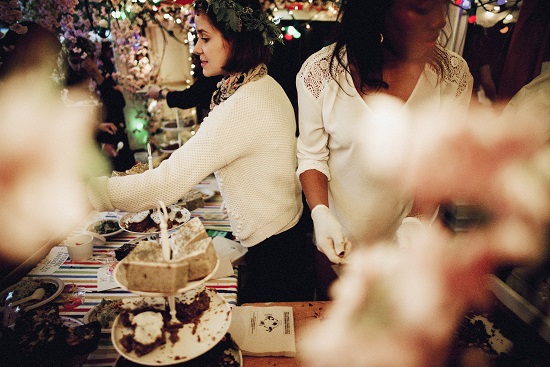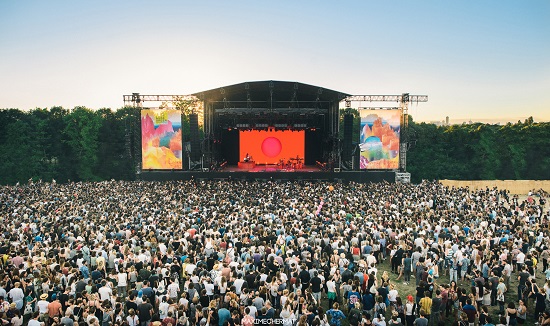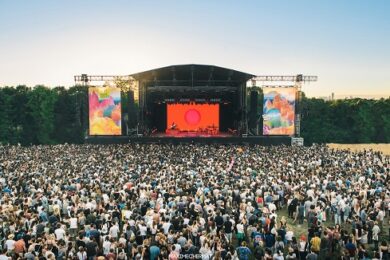We Love Green, in the beautiful Bois de Vincennes on the eastern outskirts of Paris, is one of the few festivals that lives up to that old cliché: an event with a difference. Established by French agency We Love Art, whose ventures beginning in the French electronic scene have been characterised from the outset by an intense desire to be unique, the festival lends as much focus to its philosophy as its bands.
As its name indicates, the opener of France’s festival season is underpinned by a strong environmental message, and an aim to make the event sustainable and eco-friendly; “What resources do we have to hand, and what can we make with them?” is their guiding philosophy. In addition to its superb musical line-up We Love Green hosts a Think Tank of some of the world’s leading thinkers, scientists, activists, artists and sociologists that is as just integral as its live music programming.
Not that the music’s to be sniffed at either; in Björk they have the perfect headliner. Taking the rich philosophies of the Icelander’s most recent album in mind, it’s hard to imagine a more perfect fit between artist and event. Elsewhere, intent on delivering the kind of eclecticism not often available elsewhere in French festivals, alongside the likes of Beck, Tyler The Creator, Father John Misty and Migos, they host the picks of the country’s burgeoning hip-hop scene and national treasure Charlotte Gainsbourg. Reflecting the festival’s roots in electronica, the weekend additionally features hefty dance programming from the likes of Daphni, Dixon, Nina Kravitz, Jamie xx and more.
As if that’s not enough, the festival also puts a focus on food that goes beyond its contemporaries, with an entire jury dedicated to selecting the greatest gourmet food that Paris has to offer led by 3-star Michelin chef Pascal Barbot. There will be a selection of some of the nation’s finest chefs at ‘La Bistrotheque’, vegetarian and vegan specialists in the ‘Veget-Hall’, fast-rising and undiscovered ‘Les Primeurs’ and more. 200-person strong banquets are also on offer with chefs from Les Grands Verres (palais de Tokyo), Mary-Celeste, Candelaria and Hero.
To find out more, tQ caught up with We Love Green’s founder Marie Sabot to take us through the story, philosophy and art behind this special festival, which takes place June 2-3.

Firstly, can you take us through the history of We Love Green?
The festival took place for the first time in 2011, this is the seventh edition. We all come from the electronic scene, organising parties in unusual places and unusual venues over the past ten years, so we were used to producing events that were unexpected, taking care of big, complicated technical music productions. In 2010 we were looking for a new place to build a different event and to create the kind of line-up that we couldn’t find in Paris. In France, often you find electronic festivals, hip-hop festivals and rock festivals, but we wanted to be more modern and to have a bigger picture of what’s going on in music now.
That’s why our line-up has always been different, since the beginning. We’re mixing different kinds of music that never usually mixed in France. From the beginning we took inspiration from Japanese and English festivals, gathering inspiration before we presented ourselves to the city of Paris to set up a brand new festival with sustainable production, sustainable logistics and sustainable ways of building it.
Why is sustainability such a massive focus for We Love Green?
Because it’s the way of the future! There is only one way, we think. When you are building an outdoor event which is among nature, this is the only way to do it. It took two years to convince the city of Paris to give us one of the most delicate botanic parks in the city, Parc de Bagetelle, which can be compared in a way to End Of The Road Festival in Dorset.
The first year of the festival took place there, but because big trucks couldn’t come on to the site we had to find new solutions and new structures. We borrowed a tee-pee from a sports event, we re-organised the bars and the restaurants to make them lighter and we planned to have solar panels and recycle oil. We are working with a lot of English and German festivals, linking with a lot of forward-thinking festivals. They help us to find interesting solutions and little by little we organise new guidelines for the restoration, the waste, the plates and the dishes, which are now composted to be put in the fields. During the first three years of the festival we found in solutions in energy, waste, water and transportation that laid the groundwork for the festival. Now that the festival is bigger we can keep on growing with these guidelines.
In many ways Björk seems the perfect headliner for a festival like We Love Green
Of course! We’re so honoured to welcome her and her universe to our festival. We’ve been inviting her for several years, and I think this is the right moment for us and for her, she’s in a very good mood! She seems to be quite powerful this year, and as an artist I think she’s particularly creative. I think this is the right time for her to give us a lot of energy, a lot of hope and a lot of creativity.
What about the rest of the line-up, who are your personal picks?
It’s very difficult! There’s a lot of very different artists, but we’re very happy to welcome The Internet and to welcome Tyler The Creator for a very rare French show; I hope there is perhaps some exchange between them. King Krule also, who’s playing his first show at the festival. Us, Primavera and Field Day are opening the festival season so these are brand new shows for all these bands. By the end of the summer they’ll be more efficient, but for those first shows there’s so much anticipation, the artists are excited and nervous of their first dates, and there’s a lot of different energy.
We also have big electronic headliners like Dixon, Nina Kravitz and The Black Madonna. It’s not so often in France that you’ll have electronic acts in the afternoon – the dance-floor’s different in the afternoon. The mix between the scenes could be interesting, and we’ll also have Jamie xx to close the main stage on Saturday night. To see the main stage change into a dance-floor at the end of Saturday, that will be a very nice moment.
What about the French acts that might be unfamiliar to those outside the country?
Hip hop is going to change the French musical landscape, it’s started invading the mainstream radio stations, and we now have major French rappers who are starting to talk to huge amounts of people from their generation, and it’s not cheesy any more. The headliner on Saturday for example, is Orelsan, he’s a major winner at all the French awards this year. At the other stage you have Lomepal, who comes from the skate culture. He’s very funny, like our Tyler The Creator. You also have Moha La Squale who’s on the newcomers’ stage. He’s a young rapper from the suburbs with incredible energy. It’ll be his first big festival.
On Sunday we’ve got Charlotte Gainsbourg, she’s an icon for France and her last album was incredible. The lighting and the festival set-up will be amazing – we have a special tent for that kind of show, where you can also find Ibeyi, King Krule and Migos. It’ll be very interesting, even in the day because all four stages are very different in terms of design, to take care of every different show. They’re all totally different.
The Think Tank seems almost as important as the music, can you tell us more about what’s going on there?
It’s quite new, it began in a little tent and now it’s a real stage, a Think Tank that’s right in the centre of the festival. People are coming to the conference from France and from the rest of the world to exchange ideas. We decided to invite a lot of scientists. The Think Tank is really not a political place, or a place for violent arguments between ecologists, activists and politicians, we want to go deeper, to learn things and to listen to the ideas of a lot of people. The first topic is how to create rights for all non-humans, nature and animals all over the world and to defend biodiversity. We’ll have discussions between agronomic engineers and philosophers, talking about cooperation instead of Darwinism, which needs to be the aim of everyone.
Another topic is the role of the city in changing the way ecologic sustainability is focused. A lot of the time we look to the countryside, but the city needs to change totally to become a real leader in the sustainability of the world. We have a big talk on waste management featuring contemporary artists, and we’ll also have discussions between a famous journalist in France and a German biologist who’s written a book about how trees can talk to each other, how the forest built itself little by little and has shown that vegetables are talking to each other in order to grow without destroying each other.
We Love Green 2018 takes place on June 2-3 and is headlined by Björk and Migos. For more information, click here.



